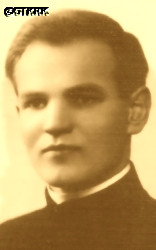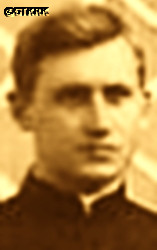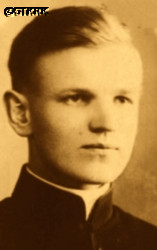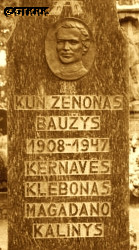Roman Catholic
St Sigismund parish
05-507 Słomczyn
85 Wiślana Str.
Konstancin deanery
Warsaw archdiocese, Poland
full list:
displayClick to display full list

searchClick to search full list by categories
wyświetlKliknij by wyświetlić pełną listę po polsku

szukajKliknij by przeszukać listę wg kategorii po polsku

Martyrology of the clergy — Poland
XX century (1914 – 1989)
personal data
religious status
Servant of God
surname
BAUŽYS
forename(s)
Zeno (pl. Zenon)
forename(s)
versions/aliases
Zenonas
function
diocesan priest
creed
Latin (Roman Catholic) Church RCmore on
en.wikipedia.org
[access: 2014.09.21]
diocese / province
Kaišiadory diocesemore on
en.wikipedia.org
[access: 2017.06.16]
nationality
Lithuanian
date and place
of death
26.09.1947

ITL SevVostLagGuLAG slave labour camp network
today: Magadan oblast, Russia
more on
en.wikipedia.org
[access: 2022.01.09]
details of death
After German defeat in the World War II started by German and Russian invasion of Poland in 09.1939, after start in 1944/1945 of Russian occupation of Lithuania arrested by the Russians on 13.02.1946.
Held in Ukmergė jail and next in Vilnius prison at Rossa Str. Interrogated numerous times and tortured.
On 20.07.1946 for „collaboration with Lithuanian anti–Russian partisans” sentenced to 4 years of slave labour in Russian concentration camps Gulag.
Transported to Nakhodka in Primorsky Krai on the Sea of Japan.
The last letter arrived from Magadan port in Magadan oblast on the Sea of Okhotsk, an entry point to the ITL SevVostLag (Kolyma) Russian slave labour concentration camp.
Fate thereafter unknown — prob. perished there.
cause of death
extermination
perpetrators
Russians
sites and events
ITL SevVostLagClick to display the description, GulagClick to display the description, Vilnius (Rossa prison)Click to display the description, Ribbentrop‐MolotovClick to display the description, Pius XI's encyclicalsClick to display the description
date and place
of birth
02.02.1907

Labanorastoday: Labanoras eld., Švenčionys dist., Vilnius Cou., Lithuania
more on
en.wikipedia.org
[access: 2022.06.29]
alt. dates and places
of birth
1908
parents
BAUŽYS Charles
🞲 14.12.1864, Tverečiustoday: Tverečius eld., Ignalina dist., Utena Cou., Lithuania
more on
en.wikipedia.org
[access: 2021.12.18] — 🕆 19.11.1935, Kernavėtoday: Kernavė eld., Širvintos dist., Vilnius Cou., Lithuania
more on
en.wikipedia.org
[access: 2022.06.29]

MEIDUTĖ Caroline
🞲 1878, Pašekštistoday: Labanoras eld., Švenčionys dist., Vilnius Cou., Lithuania
more on
lt.wikipedia.org
[access: 2025.02.11] — 🕆 1960, Vilniustoday: Vilnius city dist., Vilnius Cou., Lithuania
more on
en.wikipedia.org
[access: 2022.01.06]
presbyter (holy orders)
ordination
1932?

positions held
1934 – 1946
administrator — Kernavėtoday: Kernavė eld., Širvintos dist., Vilnius Cou., Lithuania
more on
en.wikipedia.org
[access: 2022.06.29] ⋄ RC parish ⋄ Širvintostoday: Širvintos urban eld., Širvintos dist., Vilnius Cou., Lithuania
more on
en.wikipedia.org
[access: 2020.11.13] RC deanery
c. 1934
vicar — Semeliškėstoday: Semeliškės eld., Elektrėnai dist., Vilnius Cou., Lithuania
more on
en.wikipedia.org
[access: 2022.01.06] ⋄ RC parish ⋄ Elektrėnaitoday: Elektrėnai eld., Elektrėnai dist., Vilnius Cou., Lithuania
more on
en.wikipedia.org
[access: 2020.11.27] RC deanery
student — Kaunastoday: Kaunas city dist., Kaunas Cou., Lithuania
more on
en.wikipedia.org
[access: 2022.06.29] ⋄ Department of Theology and Philosophy, Universitas Vytauti Magni [i.e. Vytautas Magnus University (from 1930) / University of Lithuania (1922‐1930)]
student — Kaunastoday: Kaunas city dist., Kaunas Cou., Lithuania
more on
en.wikipedia.org
[access: 2022.06.29] ⋄ philosophy and theology, Theological Seminary
others related
in death
JACHNIEWICZClick to display biography Stanislav, SZCZEPANIUKClick to display biography Nicholas, RUDENKOClick to display biography Andronicus
sites and events
descriptions
ITL SevVostLag: Russian Rus. Исправи́тельно‐Трудово́й Ла́герь (Eng. Corrective Labor Camp) ITL Rus. Северо‐Восточный (Eng. North‐East) — concentration and slave forced labor camp (within the Gulag complex), known also as „Kolyma” — initially headquartered in Ust‐Srednekan, and then in Magadan on the Bay of Nagayev in the Magadan Oblast. Founded on 01.04.1932. Prisoners slaved at searching, developing, mining and exploiting deposits of gold, tin, tungsten, cobalt, molybdenum, radioactive raw materials and coal in dozens of mines in the region, building and operating mineral processing and enrichment plants, building access roads and railway lines, building and maintaining a number of hydroelectric power plants, power plants and combined heat and power plants, power lines, construction of river ports, airports, cities, repair and mechanical workshops, factories of construction and supporting materials (cement, glass, rubber, production of refractory materials, bricks, sulfuric acid, steel), in fishing and agriculture, etc. At its peak — till the death on 05.03.1953 of Russian socialist leader, Joseph Stalin — c. 200,000 prisoners were held there: e.g. 70,414 (01.01.1937); 90,741 (01.01.1938); 138,170 (01.01.1939); 190,309 (01.07.1940); 179,041 (01.01.1941); 166,445 (01.07.1941); 147,976 (01.01.1942); 99,843 (01.01.1943); 76,388 (01.01.1944); 87,335 (01.01.1945); 69,389 (01.01.1946); 79,613 (01.01.1947); 106,893 (01.01.1948); 108,685 (01.01.1949); 131,773 (01.01.1950); 157,001 (01.01.1951); 170,557 (01.01.1952). The prisoners were transported on ships to Magadan port on the Sea of Okhotsk, an entry point to the camp, prior to be sent to target sub‐camps. Up to 6 mln of the perished. Ceased to exist not earlier than 20.09.1949 and not later than 20.05.1952. (more on: old.memo.ruClick to attempt to display webpage
[access: 2024.04.08], www.gulagmuseum.orgClick to attempt to display webpage
[access: 2019.05.30])
Gulag: The acronym Gulag comes from the Rus. Главное управление исправительно‐трудовых лагерей и колоний (Eng. Main Board of Correctional Labor Camps). The network of Russian concentration camps for slave labor was formally established by the decision of the highest Russian authorities on 27.06.1929. Control was taken over by the OGPU, the predecessor of the genocidal NKVD (from 1934) and the MGB (from 1946). Individual gulags (camps) were often established in remote, sparsely populated areas, where industrial or transport facilities important for the Russian state were built. They were modeled on the first „great construction of communism”, the White Sea‐Baltic Canal (1931‐1932), and Naftali Frenkel, of Jewish origin, is considered the creator of the system of using forced slave labor within the Gulag. He went down in history as the author of the principle „We have to squeeze everything out of the prisoner in the first three months — then nothing is there for us”. He was to be the creator, according to Alexander Solzhenitsyn, of the so‐called „Boiler system”, i.e. the dependence of food rations on working out a certain percentage of the norm. The term ZEK — prisoner — i.e. Rus. заключенный‐каналоармец (Eng. canal soldier) — was coined in the ITL BelBaltLag managed by him, and was adopted to mean a prisoner in Russian slave labor camps. Up to 12 mln prisoners were held in Gulag camps at one time, i.e. c. 5% of Russia's population. In his book „The Gulag Archipelago”, Solzhenitsyn estimated that c. 60 mln people were killed in the Gulag until 1956. Formally dissolved on 20.01.1960. (more on: en.wikipedia.orgClick to attempt to display webpage
[access: 2024.04.08])
Vilnius (Rossa prison): After end of the World War II and start of Russian occupation of Lithuania Russians appropriated the Visitation Sisters’ cloister and Holiest Heart of Jesus church at Rossa Str. in Vilnius and used them as prison — correctional camp. As such operates till now. (more on: lt.wikipedia.orgClick to attempt to display webpage
[access: 2018.09.02])
Ribbentrop‐Molotov: Genocidal Russian‐German alliance pact between Russian leader Joseph Stalin and German leader Adolf Hitler signed on 23.08.1939 in Moscow by respective foreign ministers, Mr. Vyacheslav Molotov for Russia and Joachim von Ribbentrop for Germany. The pact sanctioned and was the direct cause of joint Russian and German invasion of Poland and the outbreak of the World War II in 09.1939. In a political sense, the pact was an attempt to restore the status quo ante before 1914, with one exception, namely the „commercial” exchange of the so‐called „Kingdom of Poland”, which in 1914 was part of the Russian Empire, fore Eastern Galicia (today's western Ukraine), in 1914 belonging to the Austro‐Hungarian Empire. Galicia, including Lviv, was to be taken over by the Russians, the „Kingdom of Poland” — under the name of the General Governorate — Germany. The resultant „war was one of the greatest calamities and dramas of humanity in history, for two atheistic and anti‐Christian ideologies — national and international socialism — rejected God and His fifth Decalogue commandment: Thou shall not kill!” (Abp Stanislav Gądecki, 01.09.2019). The decisions taken — backed up by the betrayal of the formal allies of Poland, France and Germany, which on 12.09.1939, at a joint conference in Abbeville, decided not to provide aid to attacked Poland and not to take military action against Germany (a clear breach of treaty obligations with Poland) — were on 28.09.1939 slightly altered and made more precise when a treaty on „German‐Russian boundaries and friendship” was agreed by the same murderous signatories. One of its findings was establishment of spheres of influence in Central and Eastern Europe and in consequence IV partition of Poland. In one of its secret annexes agreed, that: „the Signatories will not tolerate on its respective territories any Polish propaganda that affects the territory of the other Side. On their respective territories they will suppress all such propaganda and inform each other of the measures taken to accomplish it”. The agreements resulted in a series of meeting between two genocidal organization representing both sides — German Gestapo and Russian NKVD when coordination of efforts to exterminate Polish intelligentsia and Polish leading classes (in Germany called «Intelligenzaktion», in Russia took the form of Katyń massacres) where discussed. Resulted in deaths of hundreds of thousands of Polish intelligentsia, including thousands of priests presented here, and tens of millions of ordinary people,. The results of this Russian‐German pact lasted till 1989 and are still in evidence even today. (more on: en.wikipedia.orgClick to attempt to display webpage
[access: 2015.09.30])
Pius XI's encyclicals: Facing the creation of two totalitarian systems in Europe, which seemed to compete with each other, though there were more similarities than contradictions between them, Pope Pius XI issued in 03.1937 (within 5 days) two encyclicals. In the „Mit brennender Sorge” (Eng. „With Burning Concern”) published on 14.03.1938, condemned the national socialism prevailing in Germany. The Pope wrote: „Whoever, following the old Germanic‐pre‐Christian beliefs, puts various impersonal fate in the place of a personal God, denies the wisdom of God and Providence […], whoever exalts earthly values: race or nation, or state, or state system, representatives of state power or other fundamental values of human society, […] and makes them the highest standard of all values, including religious ones, and idolizes them, this one […] is far from true faith in God and from a worldview corresponding to such faith”. On 19.03.1937, published „Divini Redemptoris” (Eng. „Divine Redeemer”), in which criticized Russian communism, dialectical materialism and the class struggle theory. The Pope wrote: „Communism deprives man of freedom, and therefore the spiritual basis of all life norms. It deprives the human person of all his dignity and any moral support with which he could resist the onslaught of blind passions […] This is the new gospel that Bolshevik and godless communism preaches as a message of salvation and redemption of humanity”… Pius XI demanded that the established human law be subjected to the natural law of God , recommended the implementation of the ideal of a Christian state and society, and called on Catholics to resist. Two years later, National Socialist Germany and Communist Russia came together and started World War II. (more on: www.vatican.vaClick to attempt to display webpage
[access: 2023.05.28], www.vatican.vaClick to attempt to display webpage
[access: 2023.05.28])
sources
personal:
newsaints.faithweb.comClick to attempt to display webpage
[access: 2021.12.19], angelorum.ltClick to attempt to display webpage
[access: 2018.09.02], www.kolyma.ltClick to attempt to display webpage
[access: 2018.09.02]
original images:
www.voruta.ltClick to attempt to display webpage
[access: 2018.09.02], www.sirvinta.netClick to attempt to display webpage
[access: 2018.09.02], www.sirvinta.netClick to attempt to display webpage
[access: 2018.09.02], www.limis.ltClick to attempt to display webpage
[access: 2018.09.02], angelorum.ltClick to attempt to display webpage
[access: 2018.09.02]
LETTER to CUSTODIAN/ADMINISTRATOR
If you have an Email client on your communicator/computer — such as Mozilla Thunderbird, Windows Mail or Microsoft Outlook, described at WikipediaPatrz:
en.wikipedia.org, among others — try the link below, please:
LETTER to CUSTODIAN/ADMINISTRATORClick and try to call your own Email client
If however you do not run such a client or the above link is not active please send an email to the Custodian/Administrator using your account — in your customary email/correspondence engine — at the following address:

giving the following as the subject:
MARTYROLOGY: BAUŽYS Zeno
To return to the biography press below:
 Click to return to biography
Click to return to biography












